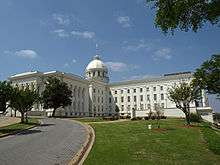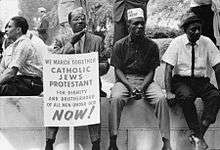T.K. Thorne
| T.K. Thorne | |
|---|---|
.png) T.K. Thorne, Author | |
| Born |
April 17, 1954 Montgomery, Alabama |
| Occupation | American Writer |
| Education | Masters of Social Work, University of Alabama |
| Spouse | Roger Thorne |
| Children | Step-mother to three sons (Mac, Jeremiah and Harry) |
| Website | |
|
www | |
Teresa (Katz) Thorne was born April 17, 1954 in Montgomery, Alabama. Her father was a WWII veteran, a former engineer with the Department of the Navy, and an executive with a dry goods/clothing outlet. Her mother was the State Legislative Chairperson for the League of Women Voters and an active reformer of the Alabama State Legislature. Thorne's youth was spent in a climate of civil unrest, as Montgomery was a hotbed for the American Civil Rights Movement. She attended the University of Alabama and obtained a Masters in Social Work before being hired as the first Jewish female officer for the Birmingham Police Department in Alabama, eventually promoted to captain.
Following retirement from the police force, Thorne began another career as Executive Director of City Action Partnership, a non-profit business improvement District in downtown Birmingham, Alabama. Thorne also turned to writing (under the name of T.K. Thorne) and produced a number of notable works, including three books. Two were novels, both centered on historical research and women: the first set in 5500 BCE, Noah’s Wife (2009), and second in the biblical time of Abraham and the ancient story of Sodom and Gomorrah, Angels At The Gate (2015). In 2013, however, Thorne drew on her background in law enforcement and strong family association with civil rights leaders to debut Last Chance for Justice: How Relentless Investigators Uncovered New Evidence Convicting the Birmingham Church Bombers, a non-fictional account of the four decade long case to convict Ku Klux Klan members for the 1963 bombing of an African American church in Birmingham, Alabama (which killed four young girls and changed civil rights history).[1][2][3][4] Thorne has received a number of awards for her literary works, including poetry, short stories and screenplays. She and her immediate family remain in Alabama.
Early Years
Thorne was born on April 17, 1954 in Montgomery, Alabama, the first of three children, to father Warren Katz, a WWII veteran and civilian engineer at the Charleston Naval Shipyard who, at the time, was an executive for Steiner Lobman, a large dry goods/clothing manufacturer and distributor in Alabama. Her mother, Jane Katz, a descendant of the prominent Lobman family, became a mother of three (Thorne, sister and brother). She was an active reformer of the Alabama State Legislature, focusing on education, child care, property tax reform, consumer and environmental protection, election/campaign finance/ethics reform, political action committee regulation, and reform of the Constitution of the State of Alabama. She also worked for the passage of the Equal Rights Amendment, became the State Legislative Chairperson for the Alabama League of Women Voters, published the Capitol (Legislative) Newsletter, and was eventually inducted into the Alabama Women's Hall of Fame (2002).[5]




White resistance and lack of government support for equal minority rights in Montgomery increased frustrations within the black community, despite growing support in Alabama for the National Association for the Advancement of Colored People (NAACP). In 1954, Martin Luther King Jr. was pastor of the Dexter Avenue Baptist Church in Montgomery. Events during this time period included Rosa Parks' arrest for refusing to give up her bus seat, which led to the Montgomery Bus Boycott, 1955–1956, Selma to Montgomery Marches of 1965, including "Bloody Sunday," and other Civil Disobedience. Thorne was nine during the 1963 March on Washington for Jobs and Freedom, King's I Have a Dream speech, which included:"I have a dream that one day, down in Alabama, with its vicious racists...," and the bombing of the Sixteenth Street Baptist Church in Birmingham, Alabama.[6] The volatile social climate of her youth may have influenced Thorne's post-secondary choices: a Masters of Social Work (magna cum laude) at the University of Alabama, and in 1977, a position as the first Jewish female officer with the Birmingham Police Department. She retired as a captain and assumed an Executive Director position with City Action Partnership (CAP) in Birmingham (a position in which she continues to serve).[7]
Literary career
Thorne's grandmother Dorothy Lobman played a pivotal role in Thorne's life, encouraging passion for the written word and need for social reform (the latter reflected in her stance for civil rights during the Montgomery Bus Boycott). Thorne, in turn, became an avid and diverse reader. In 1986, she lost her mother but the values her mother exemplified remained, including "that intelligence, perseverance, and charm were not mutually exclusive, and one’s primary responsibility in life was to make the world a better place." Her father, who encouraged self-reliance in Thorne "and to question everything," was now a broker with Merrill Lynch.[8]
Thorne's Jewish religious roots may have encouraged her attraction to historical and biblical novels, with both based on reinterpreted stories told from the perspectives of unnamed, briefly-mentioned women of the Bible: the wives of Noah and Lot (Genesis).[9] They also mix story-telling with settings based on archeological findings and scientific theories that have uncovered new information about ancient cultures, and Thorne’s personal travels, including Israel and Turkey. Noah’s Wife, for example, is set in the time that geologists believe a great flood occurred in the Black Sea region (5500 BCE), while Angels at the Gate (Cappuccino Books, 2015) is based on both legend and research surrounding the catastrophes that burned the cities of Sodom and Gomorrah. Thorne's literary talents also extend to poetry, short stories and screenplays.
Thorne has garnered several awards (refer list below), including ForeWord Review Magazine's 2009 Historical Fiction Book of the Year for Noah’s Wife (Chalet Publishing, 2009, Blackburn Fork Publishing, 2011).[10][11] The New York Post also featured her first historical non-fiction book Last Chance for Justice: How Relentless Investigators Uncovered New Evidence Convicting the Birmingham Church Bombers (Lawrence Books, 2013)[12] Birmingham in the 1960s was a focal point of the Civil Rights Movement. Dogs and fire hoses were turned on marchers and the 16th Street Baptist Church was bombed by the Ku Klux Klan, killing four young girls.[13] A short film developed from her screenplay "Six Blocks Wide" (Shapefilms, 2007) was also a semi-finalist at the international A Film for Peace Festival in Italy.
Thorne has served as faculty at several writers’ conferences, spoken on lecture circuits (including Columbus State University, Colgate University and Wake Forrest University on the Birmingham bombing), and carried a monthly column in Birmingham's Synergy Magazine for seven years[14][15] Thorne currently resides in Springville, Alabama with her husband, two dogs, a cat and a horse. She is the step-mother of three children, a grandmother of four, and is also a Yondan (4th degree black belt) in Tomiki Ryu Akidio.
Literary Awards
- "Fresh Cornbread" - Winner, Portland Book Review, 2013 for short fiction
- Noah's Wife - ForeWord Review's Book of the Year Award for Historical Fiction 2009 and Nominee, 2010 Alabama Library Association's Author Awards
- "Jim" - Winner, 2008 Chattahooche Valley Writer's Conference(Short Story Contest)
- "Alabama Dreams in Black & White" - Honorable Mention 2007 Alabama Writer’s Conclave (Published in "Whatever Remembers Us, An Anthology of Alabama Poems" — collection named 2008 Southern Independent Bookseller/SIBA Awards Finalist for Poetry)[16]
- Freedom Manor - Winner, 2006 Eugene Walters Writers Festival (Termite Hall Screenplay Award) and the "The Other Gold" - Honorable Mention, 2006 Eugene Walters Writers Festival (William March Short Story Award) [17]
- "Trouble" - Honorable Mention, Sidewalk Film Festival (SideWrite Contest)
- Snow Dancers of Veld - Second Place Del-Rey’s Online Writer’s Contest 1998 (First Chapters Novel)
- "Sea" - Winner, Magic City Writer's Short Story Contest, circa 1980
Executive Positions
- Captain, Birmingham Police Department, Birmingham, Alabama
- Executive Director, City Action Partnership, Birmingham, Alabama (DT Business Improvement District)
References
- ↑ Thorne, T. K. (17 August 2011). "Noah's Wife". Blackburn Pr – via Amazon.
- ↑ Thorne, T. K. (5 March 2015). "Angels at the Gate". Cappuccino Books Publishing – via Amazon.
- ↑ Thorne, T. K. (1 September 2013). "Last Chance for Justice: How Relentless Investigators Uncovered New Evidence Convicting the Birmingham Church Bombers". Chicago Review Press – via Amazon.
- ↑ 16th Street Baptist Church bombing
- ↑ "Alabama Women's Hall of Fame ' Jane Lobman Katz".
- ↑ Speech: http://books.google.ca/books?id=irMxJS36904C&pg=PA95&hl=en#v=onepage&q&f=false
- ↑ "CAP Is Downtown".
- ↑ Interview with TK Thorne September 2014
- ↑ "WordPress.com".
- ↑ "Noah's Wife is a Foreword Reviews' 2009 INDIEFAB Book of the Year Award Winner".
- ↑ TK Thorne (13 January 2010). "Noah's Wife.wmv" – via YouTube.
- ↑ Heller, Billy (15 September 2013). "Books you should be reading".
- ↑ "Author T.K. Thorne delves into 1963 Sixteenth Street Baptist Church bombing investigation with new book".
- ↑ "T.K. Thorne - Washington Independent Review of Books".
- ↑ http://www.ledger-enquirer.com/2013/10/24/2760775_tk-thorne-discusses-new-book-about.html?rh=1
- ↑ "2008 SIBA Book Award Finalists Announced".
- ↑ http://www.southalabama.edu/publicrelations/pressreleases/2006pr/100906a.html